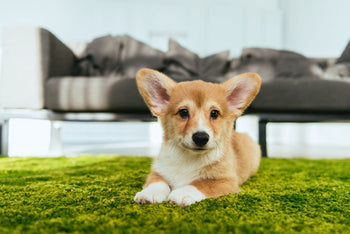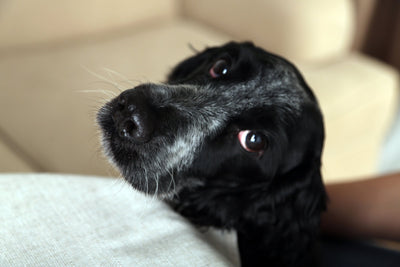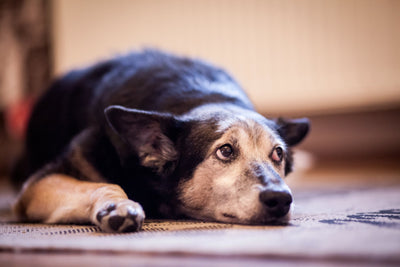How to Stop a Dog from Peeing Indoors

One of the main reason’s dogs are given to shelters or rescues is housebreaking problems. No one wants a dog that goes to the bathroom anywhere it chooses in the house. But are some dogs just stubborn and impossible to train? Human nature wants us to immediately “anthropomorphize” the dog’s behaviour. We say things like “he’s mad at me for being gone all day.” “She’s mad we brought home a new cat.” “He’s jealous about our new baby.” Or maybe it’s a puppy that just can’t seem to grasp the concept of going outside, in which case they get labelled as stubborn (a human trait) or stupid.
When it comes to peeing indoors, you have to think about it from the dog’s point of view. AND not one that is tainted through human personality traits. There have been many scientific studies done on dogs – they do not feel guilt. Nor do they associate your yelling when they come home about the pee puddle they left even just a few minutes ago. Their brains do not work like ours (and remember English is not their language!). They do react to your raised tone and facial expressions, which is where the anthropomorphized “guilty” dog look comes from. It’s actually a submissive look and a reaction to your anger.
So, if it does no good to yell at your dog, how do you solve the problem? You can start by trying to figure out the “why.”
Medical Issues
It’s always a good idea to start with medical issues! Your dog could be suffering from a urinary tract infection, kidney stone, incontinence (especially senior dogs!) or some other medical issues that is causing them not to have control over their bladder like they once did.
For dogs suffering from incontinence, a diaper may be needed as they have simply no control over when they go. We had a friend whose old dog would go in her sleep on her dog bed. She couldn’t help it.
So, if you have a dog that was house trained but is starting to have accidents its worth looking into with your vet.
Stress and Anxiety
Stress and anxiety can cause a dog to start peeing indoors. Maybe you have moved into a new house, added a new animal or human to the family, or maybe you went from working from home to being gone 8-10 hours a day and now your dog has separation anxiety. Even the opposite, you suddenly being home all day, can disrupt a dog’s routine enough that they have accidents. Changes like these can cause stress in some dogs. This does not mean they are jealous or mad, they are just anxious about the changes. You can help these dogs with a trip to your vet. Calming supplements, pheromones, anxiety wraps and other treatments may help. So does time and patience. Often this type of peeing will go away on its own as your dog adjusts to her new life.
Did you know this can even cause male dogs to mark?? Of course, being intact can make him much more likely to mark, but even altered male dogs will mark on your things if they get stressed or anxious. Putting a belly band on them temporarily and finding ways to alleviate the stress as mentioned above can help avoid accidents while your dog adjusts and calms down.
Unreasonable Expectations
Sometimes, dogs are going to the bathroom in the house simply because they cannot hold it any longer. This is especially so for tiny dogs, puppies and seniors. Dogs with small bladders or weakened control over their bladder (puppies, seniors, and those with medical conditions), cannot be expected to hold their pee for as long as a large, healthy, adult dog. For these dogs, you need to be able to take them more often, depending on their needs. That may mean every 3-4 hours! If you work, that can be a problem. If you can’t put in a dog door so your dog can go as she pleases, the best solution is to teach your dog to use a pee pad, litter box, or a fake turf box they make for dogs. This way, your dog is not peeing indoors where you do not want him to, but he can relieve himself when he has to.
Submissive or Excitement Peeing
Submissive peeing is probably the most difficult type of indoor peeing you will have to deal with. For some dogs, their stress and anxiety about the world – including us humans – is so great, they cannot control their bladder. Excitement peeing is the same thing…except it comes from being too excited about the world. Both are forms of dogs being over threshold about their environment. And both need to be treated with the help of a vet (the calming items mentioned above may help both dogs) as well as a canine behaviourist/dog trainer who can help you teach your dog to relax and be under that threshold, so they can keep control of their bladder.
Another trick for any dog peeing indoors? FOOD! Remember, dogs are den animals and they do not mess in their den (that’s why crate training works. If your dog always goes on one carpet, feed your dog literally on that carpet by spreading his kibble on it (or your bed, or wherever your dog tends to go). Allowing your dog in every room of the house to eat and sleep sets up your whole house as your dog’s “den,” so she will be less likely to want to relieve herself in it.
Understanding the reasons behind why your dog is peeing indoors is the first step to trying and stop the problem. Seeking help from professionals like your vet and a dog trainer that uses positive reinforcement methods will help you and your dog get into a routine you can both live with, so you can enjoy your life with your dog.








